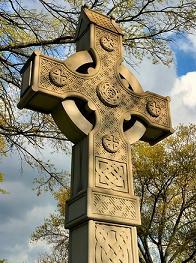Interestingly enough, as this election approaches, I happen to be leading a Bible study on Paul's letter to the Philippian's on Monday nights. This is a letter that contains a considerable amount of political language. This was not intentional on my part. As those in the Bible study know, they were given many choices as to which book we would study and it just so happened that Philippians received the most votes.
The passage which our Bible study group will be discussing this evening exhibits some of this political language. In Philippians 1:27, Paul writes "Only politic yourselves worthily of the good news of the Messiah" (my own translation). The political nature of this verse is often masked over by most English translations when the Greek word πολιτεύεσθε (politeuesthe) is rendered with something generic like "conduct" or "live your life". The word refers specifically to acting as a citizen or in accordance with one's citizenship, a metaphor that Paul will evoke again in 3:20. Therefore, Paul is calling upon the church at Philippi to have a certain kind of politics; that is, to organize themselves in a way that is representative of the victory that God has won in Jesus Christ. The Philippian church is not to follow the politics of the Roman Empire. They are two have their own politics which are determined by the gospel of Jesus Christ.
 So then, what might a politics centered around the Messiah look like? Of course, it will take much more than a few verses of Scripture to answer that question. Nonetheless, Paul's elaboration on this point in the verses that follow is instructive. He says that the Christians in Philippi should politic themselves in a manner worthy of the gospel of Christ so that whether Paul himself is able to come and see them or only hears a report about them, the church in Philippi will stand firm in one Spirit, one body striving together in the faith of the gospel, and not fearing those who oppose them (v.27-28). Paul says that they will do this because it has been granted to them not only to put their trust in Christ but also to suffer on behalf of Christ as is Paul himself (v.29-30). In this passage at least, when Paul tells the church at Philippi to have a politics of the gospel, he emphasizes a unity in the Spirit and the ability to face suffering without fear.
So then, what might a politics centered around the Messiah look like? Of course, it will take much more than a few verses of Scripture to answer that question. Nonetheless, Paul's elaboration on this point in the verses that follow is instructive. He says that the Christians in Philippi should politic themselves in a manner worthy of the gospel of Christ so that whether Paul himself is able to come and see them or only hears a report about them, the church in Philippi will stand firm in one Spirit, one body striving together in the faith of the gospel, and not fearing those who oppose them (v.27-28). Paul says that they will do this because it has been granted to them not only to put their trust in Christ but also to suffer on behalf of Christ as is Paul himself (v.29-30). In this passage at least, when Paul tells the church at Philippi to have a politics of the gospel, he emphasizes a unity in the Spirit and the ability to face suffering without fear. For me, this is yet another reminder of what it means to be a Christian in the season of campaigns and elections. It has so little to do with who is elected or what laws are passed. As citizens in a democracy, we have been given a level of influence in the politics of the empire that the Christians in Paul's day did not enjoy and I believe we should exercise that influence recognizing that it is one of the many gifts with which God has entrusted us as stewards of his creation. However, even as we cast our vote, we must remember the American political process is ultimately about the politics of the empire and not the politics of the Church and God's kingdom. Whoever is elected, whatever laws are passed, and whatever happens to America as a nation, the politics of the Church remain relatively unchanged. Our politics, oriented around the good news of Jesus Christ and his kingdom, mean that we must be united by a love that is greater than all the forces that threaten to divide us and that we must be willing to give of ourselves for others just as Christ gave of himself for us. A witness of fearless unity and sacrifice are the party line in the politics of the Church.
No comments:
Post a Comment